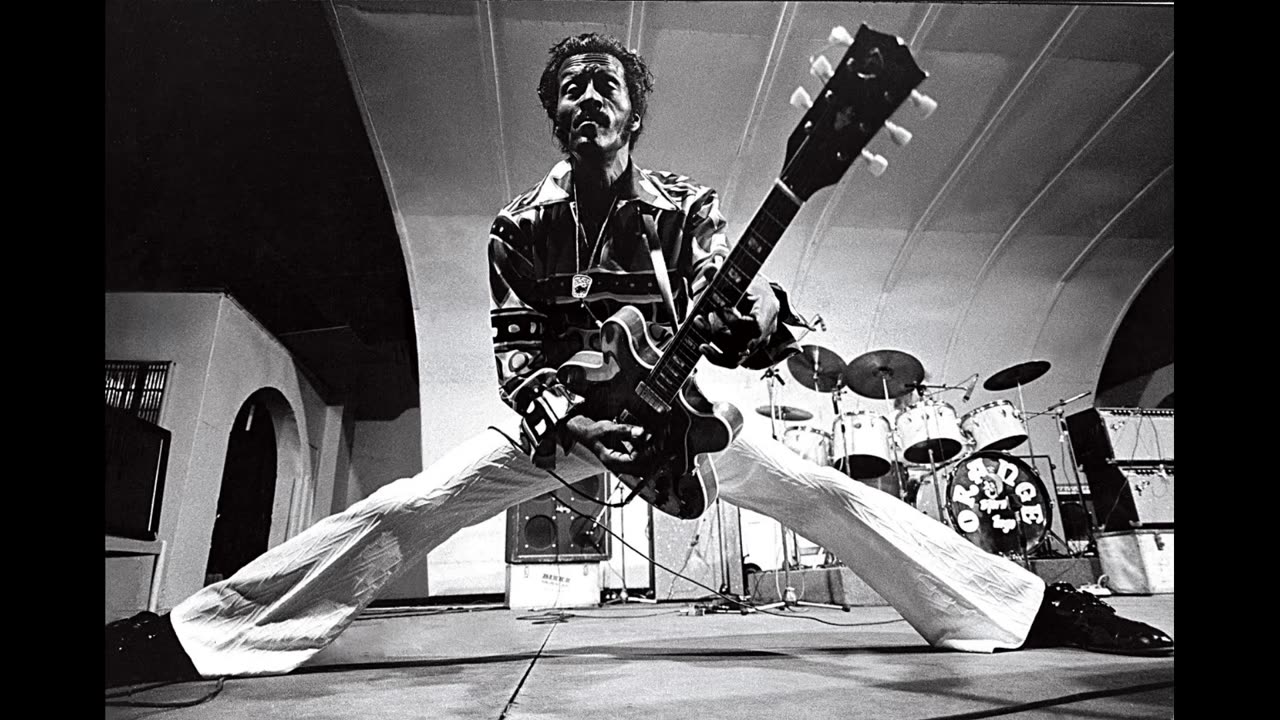Premium Only Content

Chuck Berry - The Chess Box ( Disc 1 )
Chuck Berry - The Chess Box
Released 1988
Recorded May 21, 1955 – 1973
Genre Rock and roll
Length 198:17
Label Chess
Producer Leonard Chess, Phil Chess, Chuck Berry, Esmond Edwards
Compiler Andy McKaie
"Maybellene" (2:18)
"Wee Wee Hours" (2:02)
"Thirty Days" (2:21)
"You Can't Catch Me" (2:42)
"No Money Down" (2:56)
"Downbound Train" (2:49)
"Brown Eyed Handsome Man" (2:15)
"Drifting Heart" (2:47)
"Roll Over Beethoven" (2:22)
"Too Much Monkey Business" (2:53)
"Havana Moon" (3:06)
"School Days" (2:40)
"Rock and Roll Music" (2:30)
"Oh Baby Doll" (2:36)
"I've Changed" (3:04)
"Reelin' and Rockin'" (3:15)
"Rockin' at the Philharmonic" (3:21)
"Sweet Little Sixteen" (3:10)
"Johnny B. Goode" (2:37)
"Time Was" (Gabriel Luna, Miguel Prado, Bob Russell) (1:56)
"Around and Around" (2:38)
"Beautiful Delilah" (2:13)
"House of Blue Lights" (Don Raye, Freddie Slack) (2:24)
"Carol" (2:46)
Charles Edward Anderson Berry (October 18, 1926 – March 18, 2017) was an American singer, guitarist and songwriter who pioneered rock and roll. Nicknamed the "Father of Rock and Roll", he refined and developed rhythm and blues into the major elements that made rock and roll distinctive with songs such as "Maybellene" (1955), "Roll Over Beethoven" (1956), "Rock and Roll Music" (1957), and "Johnny B. Goode" (1958). Writing lyrics that focused on teen life and consumerism, and developing a music style that included guitar solos and showmanship, Berry was a major influence on subsequent rock music.
Born into a middle-class black family in St. Louis, Berry had an interest in music from an early age and gave his first public performance at Sumner High School. While still a high school student, he was convicted of armed robbery and was sent to a reformatory, where he was held from 1944 to 1947. After his release, Berry settled into married life and worked at an automobile assembly plant. By early 1953, influenced by the guitar riffs and showmanship techniques of the blues musician T-Bone Walker, Berry began performing with the Johnnie Johnson Trio. His break came when he traveled to Chicago in May 1955 and met Muddy Waters, who suggested he contact Leonard Chess, of Chess Records. With Chess, he recorded "Maybellene"—Berry's adaptation of the country song "Ida Red"—which sold over a million copies, reaching number one on Billboard magazine's rhythm and blues chart.
By the end of the 1950s, Berry was an established star, with several hit records and film appearances and a lucrative touring career. He had also established his own St. Louis nightclub, Berry's Club Bandstand. He was sentenced to three years in prison in January 1962 for offenses under the Mann Act—he had transported a 14-year-old girl across state lines for the purpose of having sexual intercourse. After his release in 1963, Berry had several more successful songs, including "No Particular Place to Go", "You Never Can Tell", and "Nadine". However, these did not achieve the same success or lasting impact of his 1950s songs, and by the 1970s he was more in demand as a nostalgia performer, playing his past material with local backup bands of variable quality. In 1972, he reached a new level of achievement when a rendition of "My Ding-a-Ling" became his only record to top the charts. His insistence on being paid in cash led in 1979 to a four-month jail sentence and community service, for tax evasion.
Berry was among the first musicians to be inducted into the Rock and Roll Hall of Fame on its opening in 1986; he was cited for having "laid the groundwork for not only a rock and roll sound but a rock and roll stance." Berry is included in several of Rolling Stone magazine's "greatest of all time" lists; he was ranked fifth on its 2004 and 2011 lists of the 100 Greatest Artists of All Time and 2nd greatest guitarist of all time in 2023. The Rock and Roll Hall of Fame's 500 Songs That Shaped Rock and Roll includes three of Berry's: "Johnny B. Goode", "Maybellene", and "Rock and Roll Music". "Johnny B. Goode" is the only rock-and-roll song included on the Voyager Golden Record.
Born in St. Louis, Berry was the youngest child. He grew up in the north St. Louis neighborhood known as the Ville, an area where many middle-class people lived. His father, Henry William Berry (1895–1987) was a contractor and deacon of a nearby Baptist church; his mother, Martha Bell (Banks) (1894–1980) was a certified public school principal. Berry's upbringing allowed him to pursue his interest in music from an early age. He gave his first public performance in 1941 while still a student at Sumner High School; he was still a student there in 1944, when he was arrested for armed robbery after robbing three shops in Kansas City, Missouri, and then stealing a car at gunpoint with some friends. Berry's account in his autobiography is that his car broke down and he flagged down a passing car and stole it at gunpoint with a nonfunctional pistol.He was convicted and sent to the Intermediate Reformatory for Young Men (now the Algoa Correctional Center) in Jefferson City, Missouri, where he formed a singing quartet and did some boxing. The singing group became competent enough that the authorities allowed it to perform outside the detention facility. Berry was released from the reformatory on his 21st birthday in 1947. On October 28, 1948, Berry married Themetta "Toddy" Suggs, who gave birth to Darlin Ingrid Berry on October 3, 1950. Berry supported his family by taking various jobs in St. Louis, working briefly as a factory worker at two automobile assembly plants and as a janitor in the apartment building where he and his wife lived. Afterwards, he trained as a beautician at the Poro College of Cosmetology, founded by Annie Turnbo Malone. He was doing well enough by 1950 to buy a "small three room brick cottage with a bath" on Whittier Street.
-
 44:34
44:34
PMG
2 hours ago $0.51 earned"Caitlin Clark Says She Has “White Privilege” Why Caitlin WHY???"
5.77K1 -
 1:06:50
1:06:50
Dr. Drew
9 hours agoRoger Ver, Jan 6ers, Ross Ulbricht: Who Should Trump Pardon First? w/ Robert Barnes & Aaron Day – Ask Dr. Drew
31.5K3 -
 11:56
11:56
Tundra Tactical
3 hours ago $1.38 earnedWas the UnitedHealthcare CEO Assassination a PSYOP?
12.1K4 -
 52:46
52:46
Sarah Westall
2 hours agoPower of Nocebo and Placebo in Health & Politics. Quantum Energy Advancements w/ Ian and Philipp
21.3K3 -
 54:59
54:59
LFA TV
23 hours agoLee Smith Discusses ‘Disappearing the President’ | Trumpet Daily 12.11.24 7PM EST
17.2K -
 1:48:15
1:48:15
2 MIKES LIVE
5 hours ago2 MIKES LIVE #154 w/ Spcieal Guests, BRIANNE DRESSEN, DAN SMERIGLIO and ADAM DERITO!
9.35K -
 1:28:46
1:28:46
Redacted News
6 hours agoBREAKING! CIA DEEP STATE PLAN TO STOP TRUMP ACCELERATES WITH FALSE FLAGS TIED TO IRAN | REDACTED
154K292 -
 5:38:59
5:38:59
Dr Disrespect
9 hours ago🔴LIVE - DR DISRESPECT - FORTNITE - FIRST PERSON MODE
215K70 -
 1:01:25
1:01:25
Exploring With Nug
10 hours ago $1.86 earnedMissing Person Found After 25 Years With A Dark Past! What Did He Do?
22.7K1 -
 1:02:09
1:02:09
In The Litter Box w/ Jewels & Catturd
1 day agoFANI IN DEFAULT | In the Litter Box w/ Jewels & Catturd – Ep. 703 – 12/11/2024
80.2K24